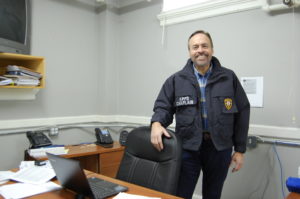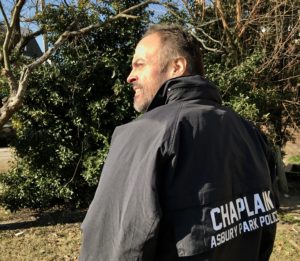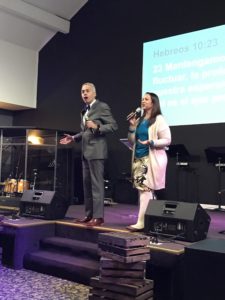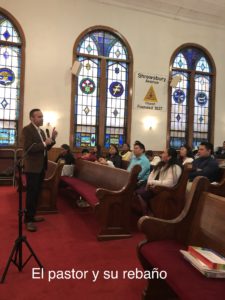Employee Spotlight: Human trafficking educator reflects on a life of service
 The Rev. Dr. Dan Correa does a lot of talking.
The Rev. Dr. Dan Correa does a lot of talking.
He’s lead presenter for Catholic Charities, Diocese of Trenton’s Human Trafficking program, which has him talking to community groups across the state to educate them about the prevalence of “modern-day slavery.”
He’s the pastor for three churches in Monmouth County, where he spends all weekend every weekend sermonizing and otherwise tending to his flocks.
And he works as police chaplain for two police departments, responding whenever called to counsel officers in crisis.
All of that talking can wear out one’s vocal chords, for sure.
“I have learned ‘voice exercises’ from my wife, who is a singer,” Correa said. “But even with these warm-up exercises, I do lose my voice at times.”
 An early calling
An early calling
Correa’s compassion for those in need is rooted in his childhood. He grew up in the Bronx, where his family attended a large church with a robust children’s ministry. At the age of 10, he became an itinerant child preacher (pictured, right) after his church asked him to speak at a Sunday service.
“I call it my ‘Donut Sermon,’” he laughed. “Some people were bringing donuts into the church and dirtying up the church. So my message was: ‘We need to take care of the house of God! You can eat donuts all you want, but don’t bring them into the church!’ People loved it. It started a conversation in our church, where people agreed: We really need to take care of our church!”
Invitations from other churches followed, and he began preaching throughout the region. It became his career calling.
“Ever since I was 10 years old, I knew I was going to be in the ministry,” he said.
He went to Mercy College in New York and Logos University in Florida, where he earned degrees in ministry and got ordained. He was drawn to poor communities, where he felt he could have more impact.
Burgers, business … and rats?
But poor communities don’t offer rich paychecks. So Correa became “a tentmaker,” as it’s called in the ministry, supporting his family through jobs outside the church while also serving as a pastor.
Name a job and Correa probably worked it. He was a manager at McDonald’s, an analyst on Wall Street, and a horticulturalist for a municipal parks department. He ran a food pantry for the United Way. His oddest job? He worked overnight as a garbage collector for New York City’s sanitation department.
“I used to collect garbage in Harlem at 2 o’clock in the morning. Very fascinating. I got so used to the gunshots at night. You just dodge for cover. When the bullets stop, you just continue collecting garbage,” Correa said. “I got so immune to the rats. In those days, they had steel garbage cans, which alone weighed about 50 pounds. So you would have to lift them with both hands to empty them into the truck. When you picked them up, rats would jump out and onto your head and run down you to the ground. They just wanted to get away! Then they would just wait on the sidewalk until you put the can back, so they could climb back in. It was their way of life! We learned that if you didn’t bother them, they wouldn’t bother you.”
Now, he pastors Assembly of God Church in Middletown, Iglesia Vida Abundante in Asbury Park, and Iglesia La Mano de Dios in Red Bank. All have different schedules for services, so Correa is able to preach at them all every weekend.
A leader in the Latino community
Born in Puerto Rico, Correa is bilingual. He feels his ministry is especially important in Latino communities, where some of his church members are undocumented immigrants.
“Because the immigration climate is very hostile, there’s a lot of misinformation in the community that can be very detrimental when people make decisions that affect their families,” he said. “For example, they will not send their kids to school, if there’s a wild rumor that Trump has made an executive order that he will deport all Mexicans today. So they’ll keep their kids home from school – sometimes for weeks. That leads to trouble with the court system. My role as a community leader and activist is to get the right information out there.”
His work as a police chaplain began six years ago and grew out of his desire to improve the immigrant community’s relationship with law enforcement.
“I felt like there was a missing link, a gap, in my ministry, so I decided to take a certification course in chaplaincy,” he said.
After doing a few police ride-alongs, he came to appreciate the daily dangers and stresses police face.
“Police officers have a very difficult time with self-care, because they are always ‘on.’ Even off-duty, they are ‘on.’ It’s hard for them to disconnect. They take the job home with them, and it affects their health and their family life,” Correa said. “I become a buffer for them. They can beat up and vomit (verbally) on me, and it’s confidential. So there’s a lot of conversation in squad cars. Many feel like they can’t open up to a lot of people – not their supervisors, because for example, if they admit they have suicidal ideations, they may think they’ll lose their job. One of my roles is to let them know they are protected if they seek help.”
Counseling those in crisis
 As a police chaplain with Asbury Park and Middletown police departments, Correa does everything from counseling an officer about his marriage or mental health to responding to a tragedy.
As a police chaplain with Asbury Park and Middletown police departments, Correa does everything from counseling an officer about his marriage or mental health to responding to a tragedy.
“We are a first-responder, so we will be at crime scenes and emergency situations,” he said. “We’re there to provide comfort, guidance, and prayers for those who have been a victim or witness of a crime.”
He’s also certified as a New Jersey disaster-response crisis counselor.
His ministry and chaplaincy dovetail wholly with his work at Catholic Charities, he said.
“To me, Catholic Charities work is ministry,” he said. “Catholic Charities is a source of help to so many people. It’s an important tool that I have in my tool belt – I’m constantly connecting people to what we do, from our food pantries, our Rapid Rehousing, our addiction programs. A lot of people don’t know all that Catholic Charities does, but we play such an important role in helping people.”
Helping people in crisis also underscores for him how random hardship and struggle can be.
“We’re all imperfect, and we all need some help at some time in our lives,” he said. “Today it could be me, tomorrow it could be you. In a year, I could be homeless. Things happen.”
As a case manager for Catholic Charities’ statewide “Pathways to Freedom” Human Trafficking program, Correa helps victims in crisis find safe shelter, as well as ensures their long-term stability and recovery by connecting them with wrap-around services like counseling, housing, education, and career assistance. He gives free, trauma-informed, educational presentations to law enforcement, health providers, community groups, and anyone who asks about how New Jersey is a hotbed of human trafficking, due to its abundance of highways, airports, and ports and its central location on the East Coast.
Grateful for every day
He admits his days are busy.
 “I come to work every day. And then after work, I go to work,” he laughed.
“I come to work every day. And then after work, I go to work,” he laughed.
But he always finds time for his wife Nancy, who’s also an ordained minister, his two grown children, and his three grandchildren, who live with him and Nancy.
“That’s my joy. Those are my hobbies,” he says of his family.
And no way would he trade his busy schedule for anything else, especially considering he was diagnosed with terminal cancer about 25 years ago.
“I was in the ICU more than 13 times. On three different occasions, my doctor told me: ‘Say goodbye to your wife.’ But I just kept bouncing back,” Correa said. “When you face death like that, it changes you completely. That’s why I’m very grateful for every day. This is borrowed time. For me, I’m not supposed to be here. I was never supposed to meet my grandchildren, and I have. I come to work every day happy, and I give back, because I’ve been given so much.”
Subscribe for more news
For more information: To reach our Human Trafficking team, call 833-SEE-THEM (833-733-8436) or email [email protected].
To subscribe to our blog posts and news releases, fill out the fields below.


